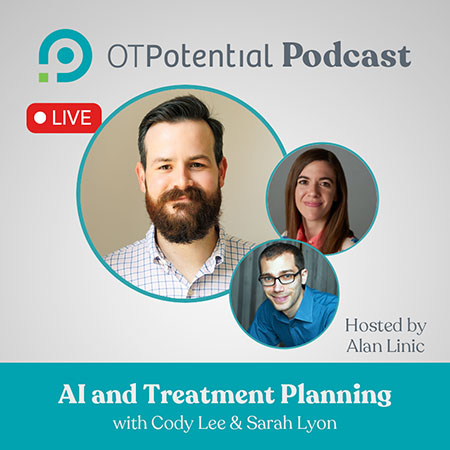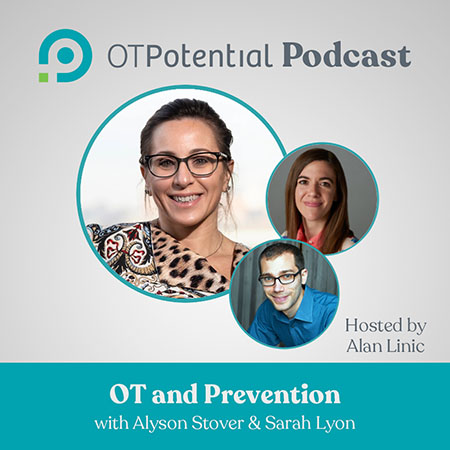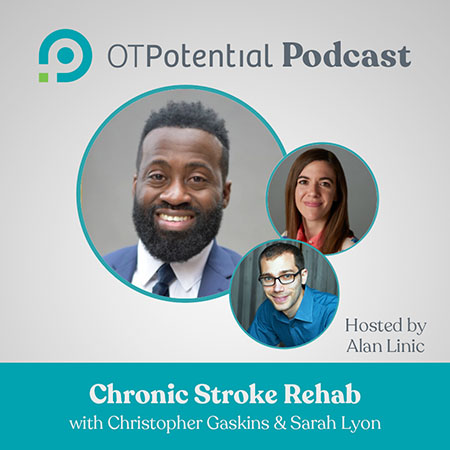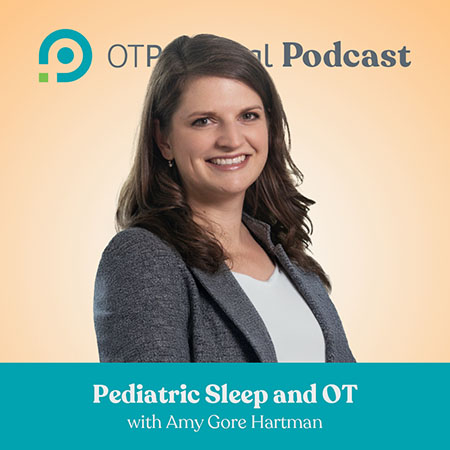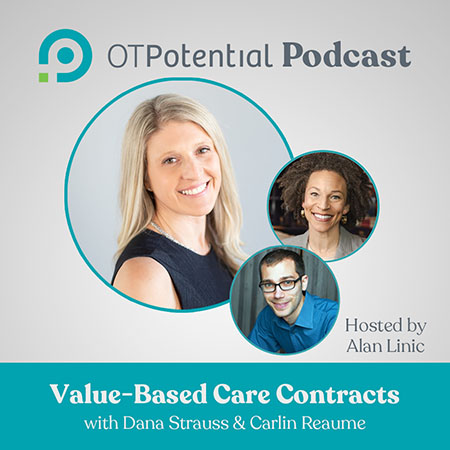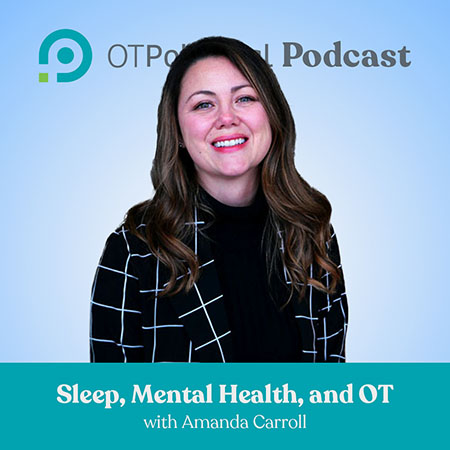Earn 1 hour of continuing education by joining OT Potential after taking this course.

Listen: Apple | Spotify | YouTube
If you are an occupational therapy professional working with autistic people, you’ve likely heard of strengths-based practice (SBP).
But, does this approach work?
And, what are the benefits of it?
In this one hour OT CEU course we will discuss a scoping review that explores these questions. As we’ll see, strengths-based interventions were related to:
- Positive social engagement
- Learning
- Self-advocacy
- Anxiety reduction
After reviewing the article, we’re delighted to welcome to the podcast the article’s lead author, Kavitha Murthi, MS (OT), OTR, FHEA (UK). Her and I will discuss the practical implications of this research for your OT practice.

Earn 1 hour of continuing education
1. Listen to the podcast for free.
2. Sign up for the OT Potential Club.
3. Pass the quiz and download your certificate!
Primary Journal Article Explored
When you log in, be sure to check out the OT Potential Club’s written breakdown of the following research article. Then, share your questions and thoughts with fellow practitioners.
Supporting Research and Journal Articles
Supplemental Materials
Programs and theories related to a strengths-based approach
- IDEAS: Inventing, Designing, and Engineering for All Students
- Double Empathy Problem
- Minority Stress Model
- Exploring interpersonal and environmental factors of autistic adolescents’ peer engagement in integrated education
- Adding the missing voice: How self-report of autistic youth self-report on an executive functioning rating scale compares to parent report and that of youth with attention deficit hyperactivity disorder or neurotypical development
Strengths-based assessments
- AIR Self-Determination Assessment
- Canadian Occupational Performance Measure (COPM)
- Child Occupational Self Assessment (COSA)
- Behavioral and Emotional Rating Scale
Learning Objectives
- You will be able to recognize strengths-based assessments OTs can utilize with autistic clients.
- You will be able to identify the components of a strengths-based approach to OT intervention.
Agenda
Intro (5 minutes)
Breakdown and analysis of journal article (5 minutes)
- The historical (and problematic) focus of autism research and clinical practice.
- Why focusing on deficits is a problem.
- The cry for change.
- Enter: Strengths-Based Practice
- Example of authentic Strengths-Based Practice.
- What was the intent of this scoping review?
- Methods
- Results
- Discussion
Discussion on practical implications for OTs (with Kavitha Murthi) (50 minutes)
- How did you first find OT?
- How did you become interested in working with autistic clients?
- Can you tell us the story of how this article came about?
- As you revisit this article, what stands out to you?
- The article stated that people with autism often face co-occurring mental health conditions. Can you elaborate on why it is important to consider mental health when working with our autistic clients?
- The article mentioned both mental health assessments and strength based assessments you found in the literature. Can you give us examples of assessments that could be helpful in practice?
- If you were seeing an autistic child in an outpatient setting, what would be some of your top considerations when it comes to planning intervention.
- I wanted to ask specifically about intervention centered around modifying the environment? What can that look like in practice?
- Through the process of writing this paper, were there any stories that really stood out to you and impacted how you think about supports for autistic people?
- What do you see as coming next in the strengths-based practice movement?
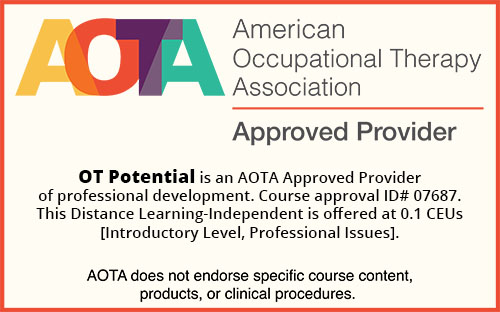
Instructional Methods/Registration/Special Needs Requests/Cancellation Policy
This course is an independent/self-study course delivered via podcast on iTunes, Spotify, Google Play & more.
If you need accommodations to take this course, please contact us and we will address your needs on an individual basis.
If we cancel a promoted course, event, live stream, or any other paid CEU offering prior to release, and you subscribe explicitly for said offering, you are eligible for a full refund if you did not complete and earn any other CEU quizzes or certificates during your subscription.
If a live webinar is cancelled that you signed up for, our system will automatically generate an email to you and if possible, we will inform you of the rescheduled date. Our most current webinar schedule will be found at: otpotential.com/live-ot-ceu-webinars.
Course Completion Requirements
In order to receive a certificate for this course, you must first participate in the podcast/webinar in its entirety. Then, you will need to take the quiz that will accompany the course and earn 75% or higher. If you pass, a certificate will be automatically generated and sent to your email. Quizzes for live (distance learning–interactive) webinars must be completed within 3 days of completing the webinar.
Target Audience/Educational Level
Our target audience is occupational therapy practitioners who are looking to learn about Strength-based OT for Autistic Clients. The educational level is introductory.
Financial and Non-financial Disclosures
It is the policy of OT Potential to disclose any financial and non-financial interest the provider or instructor may have in a product or service mentioned during an activity. This is to ensure that the audience is made aware of any bias of the speaker.
We here at OT Potential have no financial stake in this topic. Our guest, Kavitha Murthi, also has no financial disclosures.
Speakers
Kavitha Murthi MS (OT), OTR, FHEA (UK)

I am pursuing my doctoral studies at NYU Steinhardt School of Culture, Education, and Human Development in the Department of Occupational Therapy.
Before starting my journey at NYU, I completed graduate studies in Occupational Therapy in the UK and I completed my undergraduate studies in Occupational Therapy at the Maharashtra University of Health Sciences in India. Read full bio.
Sarah Lyon, OTR/L

Sarah’s passion is helping fellow OT practitioners translate evidence into daily practice. Sarah earned her BA in religion from St. Olaf College, then earned her master’s degree in occupational therapy from New York University in 2011.
Since then, she’s worked in numerous facilities, including a critical access hospital, an acute trauma hospital, and a state inpatient psychiatric hospital. Sarah is the founder/owner of OT Potential. Read more about OT Potential here.
This course was designed to meet your continuing education requirements
We designed the courses in the Club to meet the requirements for “online” and “independent/self-study” courses. To verify the requirements from your specific state (within the US), check out our post, OT Continuing Education Requirements. If you are outside of the United States and have questions, please contact us.
We are proud to be an AOTA Approved Provider and to meet the requirements for your NBCOT renewal.
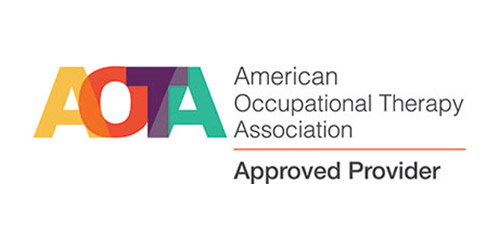

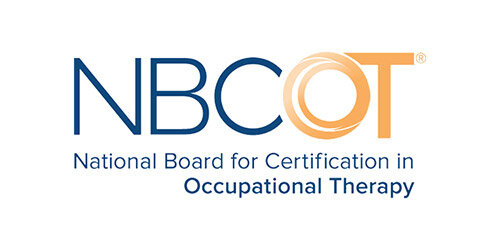
See our other OT courses!
Strengths-based OT for Autistic People • OT Potential
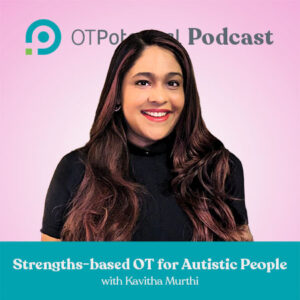
Today we’ll be covering “Strengths-based OT for Autistic Clients.” We’ll look at new research and discuss it with Kavitha Murthi.
Course Provider: Organization
Course Provider Name: OT Potential
Course Provider URL: https://otpotential.com/
Course Mode: Online
Start Date: 2023-08-07
Duration: 01:00:00
Repeat Count: 5
Repeat Frequency: Yearly
Course Type: Subscription
4.8

